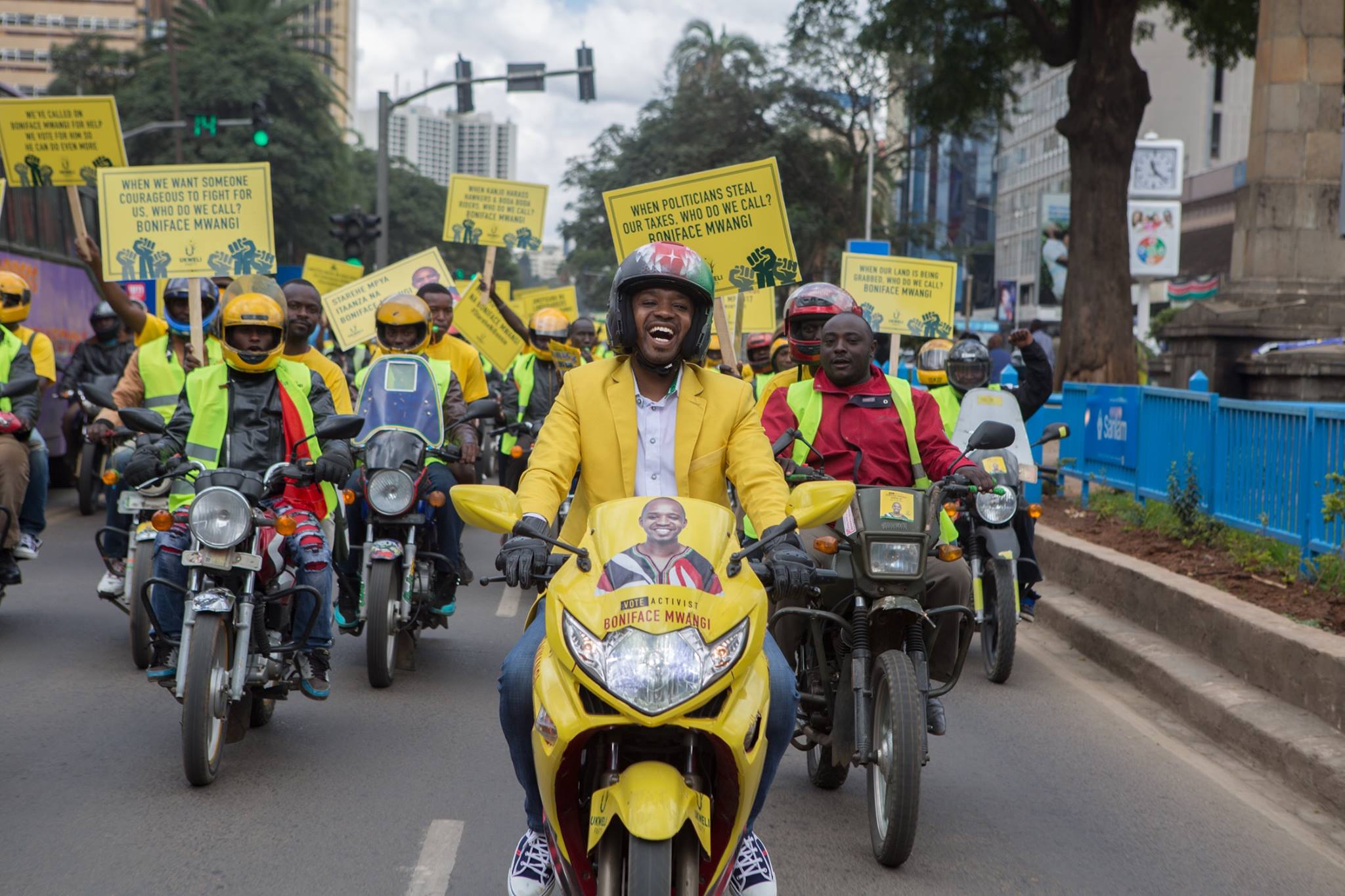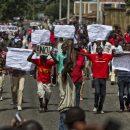Kenya: On the hopes and limits of Boniface Mwangi’s revolution

Mwangi’s turned campaigning on its head, but he needs to present a positive future vision too – for reasons of pragmatism as well as politics.

Boniface Mwangi leading a convoy of motorbike drivers in Kenya’s 2017 elections. Credit: Boniface Mwangi.
On the face of it, much about the coming Kenyan elections on 8 August is reminiscent of the last elections in 2013. Most obviously, the presidential race is once again between opposition veteran Raila Odinga and the now incumbent Uhuru Kenyatta, both fronting the latest re-incarnation of their regional/tribal alliances.
[Kenyatta vs. Odinga: A study in contrasts]
Underneath it all though, there have been some significant shifts. The new constitution has reset the political landscape so that the most desirable positions are now at the county level. Meanwhile, the electorate has got younger, with the majority of the voters now between the ages of 18 and 35. This means that while Kenya’s current crop of leaders came of age in the era of single-party politics and its attendant ethnic rivalries and corruption, the same cannot be said of most voters.
[Kenya’s 2017 elections will be like none before. Here’s why.]
For one, a good number of the younger people, particularly in major cities, have become de-tribalised to an extent. Many are more fluent in Sheng’, the local patois, than their mother tongue. They are more tuned in to other groups as well as the world at large because of the internet. And the conversations they have and the aspirations they hold are quite different from that of the old men that rule Kenya.
[Why so tense? Kenya’s high stake elections explained]
A new type of politician
This has led to the emergence of a new type of political candidate aiming to draw on and harness this shift.
The most prominent individual within this new group is Boniface Mwangi. The 34-year-old journalist-turned-activist-turned-budding-politician is running for parliament in a constituency at the heart of Nairobi. His Ukweli party (meaning “truth” in Swahili) promises “power to the people”. It professes principles of clean and issue-based politics and has a roster of just twelve candidates, having refused those who did not sufficiently meet its criteria of transparency and accountability.
In the run-up to elections, Mwangi has turned traditional forms of campaigning on their head. While most politicians address mass rallies, he goes door-to-door and engages personally with small groups of voters on the streets. While most candidates distribute handouts to supporters, he elicits contributions from them. Remarkably, he has raised around KSh6 million ($60,000) through these methods.
Other candidates employing similar tactics have had some success, but none to the extent of Mwangi. His slick website, campaign posters, video clips and even billboards show that he sits comfortably in the new Kenya.
[How the young and restless could change Kenya’s political future]
“Ballot revolution”
When Mwangi speaks, he calls for a “ballot revolution”. He believes that the citizenry needs to reclaim the country by electing the right people. After years of leading creative demonstrations – including bringing pigs to parliament to shame corrupt “MPigs” – Mwangi is now asking the electorate to help him protest from the inside. He argues that if there were a ballot revolution, the honest men and women that would be elected could instigate change through the official levers of power.
However, this would arguably not be the first time this has happened in Kenya or in neighbouring countries.
In 2002 elections, Kenya’s independence party KANU was swept out of power after nearly 40 years. A lot of good men and women were elected. But they proved unable or unwilling to fundamentally change how the country was run. Some were co-opted into what have come to be called the “cartels”. By 2013, the government was back in the hands of the successor to the old KANU.
[Kenya has become a “bandit economy”, says Chief Justice Willy Mutunga]
Over the border in Tanzania, 2015’s elections saw John Magufuli elected to the presidency. Here was another individual that personified principle and hard work. Yet two years later, he is jailing critical voices and repressing freedoms.
[Can confrontation and violence be avoided on Tanzania’s “Day of Defiance”?]
Over the other border in Uganda, Yoweri Museveni was also a good man when he rose to power in 1986, albeit not through the ballot box. That Museveni would not recognise himself today.
According to both Tanzania’s Julius Nyerere and Burkina Faso’s Thomas Sankara, the “petty bourgeois” are those who fight the system as long as they don’t control it. Once they do, they protect it.
While Kenyan voters might not articulate it in the same way, many are familiar with this phenomenon. They are sceptical of good men and women because those they elected before turned out to be petty bourgeois who had merely mastered the language of revolution.
An alternative social paradigm
This is not to suggest that Mwangi and his Ukweli colleagues would follow the same path. If elected, they may well remain true to their principles. But even if they did, their actions in office would not be sufficient to generate the radical change they insist is necessary. Their message would be drowned out by the much bigger majority pushing to maintain the status quo. Mwangi’s election would at best be a tentative early step on the road, not the destination.
What this means is that while 8 August will be important, the really significant crossroads may not come until 2022. However, if a true ballot revolution is to be realistic by then, Ukweli will need more than just good people and a frustrated electorate.
In the words of Ali Mazrui, “The peasants and the proletariat may have the power to pull down the old order. But it takes intellectuals and educated minds to conceive and construct an alternative social paradigm.”
According to this formulation, Ukweli is currently only half-baked. The party calls on voters to recognise that they have the power to change the leadership. But the alternative society being fought for is yet to be envisioned.
The language of the ballot revolution is focused on current systemic problems of injustice, corruption and self-interest. It calls on people to show courage and fight back at the voting booth. But beyond mobilising to ensure there are more people of principle in office, Mwangi and his colleagues have not yet explained what people should fight for. They have not said what will happen once corrupt leaders have been swept away, tribalism has subsided, and grabbed land has been restored.
This is not just a question of ideals. It is also one of political pragmatism. By 2022, there will likely be an even younger and more impatient electorate ready for change. However, the promise of change for its own sake or of having some upstanding candidates in office is unlikely to be enough. Voters will be listening out for a realistic, hopeful and convincing alternative offering. Articulating and arguing for that vision will take time and cannot begin early enough.
If Mwangi and Ukweli were to do this, the field would open up for the possibility of an actual revolution. They just need to be ready for it.






too much focus on the guy. personally i think he is all drama and no substance. basically….not different from what is already on offer